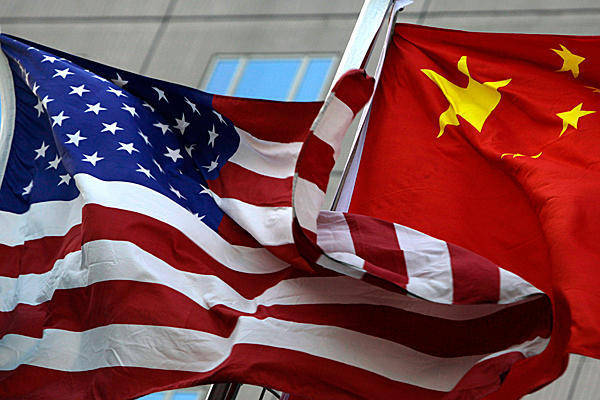America made the first step to economic war with China

Fifty US industry groups asked senators not to expose the economy to a new threat.
Washington and Beijing quarrel again. In the US Congress begin discussions of the new bill, aimed, in fact, at the introduction of economic sanctions against China. The project causes great concern among congressmen and business representatives, while Beijing has already issued a note of protest.
The essence of the proposed measures is to recognize China’s financial policy towards the yuan as a hidden export subsidy. Under American law, this automatically leads to the introduction of duties on Chinese goods. The authors of the bill believe that Beijing deliberately lowers the rate of its national currency, thereby winning an advantage in international trade. Proponents of the document believe that the yuan is now trading at 40% rates below its real value.
“My colleagues, both Democrats and Republicans, believe that by deliberate actions, China devalues its currency, and this gives its products an unfair competitive advantage in the market. It hurts our economy. It costs Americans jobs, ”Reuters quoted the Senate Democratic Party leader Harry Reid quoting.
79 senators voted against 19 voted to discuss the bill in Congress. Now his consideration will be held in both houses. However, despite the impressive support shown by the congressmen, a large part of the business is seriously concerned about the law. According to Voice of America, representatives of 50 industry groups on the eve of the last vote put their signatures on an appeal to the Senate, in which they urged the parliament not to accept the draft, so as not to cause a response from China.
“If we do something unilaterally, we will put at risk the industries producing goods exported to China, and hence the jobs in these industries,” said Kato’s trade expert at the Washington Institute Kato Dan Aikenson.
Beijing did not delay the answer. On Tuesday, 4 of October, the Chinese foreign ministry published a message on the government’s website, which stated that it “strongly opposes” the adoption of this law. According to the Chinese authorities, Washington "under the pretext of currency imbalance" is trying to take protectionist measures in the field of trade, which violates the rules of the World Trade Organization (WTO).
"The Chinese side calls on the United States to abandon protectionism and not politicize trade and economic issues in order to create a favorable environment for the development of China-US economic and trade relations," the Chinese Foreign Ministry spokesman Ma Zhaoxu quotes Al Jazeera. The Chinese authorities also note that the yuan, although slowly, is growing in value: it has risen in price by about 2005% since 30. As for the draft law, it can be interpreted as an attempt to hinder the sovereign decisions of Beijing.
The question of the legality of the law being discussed in Congress from the point of view of WTO rules remains open. The White House has not yet expressed its position on the proposed measures. On Monday, US government spokesman Jay Carney said the White House is studying the project, evaluating its effectiveness and how it fits into US international obligations. However, he noted that President Barack Obama shares the goals pursued by the document.
It is worth noting that disputes among American politicians and congressmen about the Chinese yuan have been going on for more than a year, and the uncertainty persisted during past attempts to push this bill through. In 2010, he was admitted to the House of Representatives, where the majority are members of the Republican Party, which traditionally stands for free trade. Of the 435 members of the House, only 99 Republicans voted for the project, while the rest of the votes were cast by the Democrats. However, then the law did not approve the Senate, where, oddly enough, the Democratic Party has the majority.
This year, it seems, supporters of the project has increased. According to Reuters, more than 200 congressmen are already ready to support him, while 218 is enough for adoption, and discussions have not even begun. Nevertheless, the leader of the republican majority in the lower house of representatives, Eric Cantor, who last year voted against, is not in a hurry to express his opinion on this matter. He said that it would be “curious” to wait for the position of the White House and get a better look at the draft law on the upcoming discussions.
The effectiveness of the law, if adopted, will depend on the reaction of Beijing. Supporters of the project claim that the introduction of duties on Chinese goods will replenish the budget by more than $ 250 billion and will create the basis for the creation of additional jobs. However, opponents of the law believe that even if the domestic producer is protected from competition with the Chinese, the country may lose more on its own exports if the PRC responds with similar measures.
In 2010, it was Beijing’s possible retaliatory measures that became the main deterrent to Washington. Speaking at Capitol Hill, Finance Minister Timothy Geithner said at the time of the hearings that the US needed a growing Chinese market more than China did in the US: “China imports and consumes much more goods from the United States ... China is growing at a much faster pace than exports in trade with the rest of the world. ”
The problem is not only the staggering lately American economy. At the last moment, having avoided a default in August, the American financial system was then repeatedly criticized, but no fundamental changes occurred. The most appropriate moment for bold and breakthrough decisions of the American elite can choose precisely today's time, when the internal policy of the country boils in anticipation of the election of the 2012 of the year.
Information